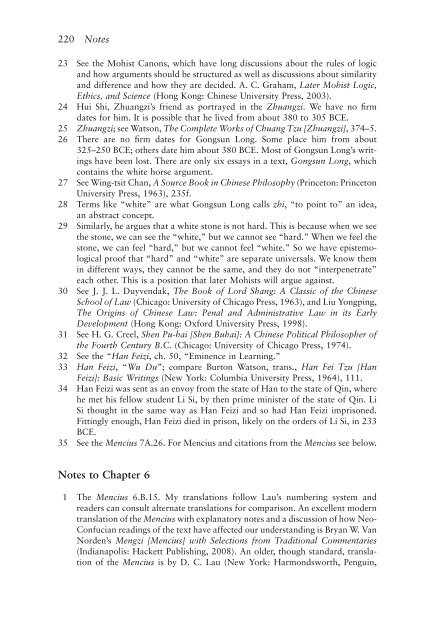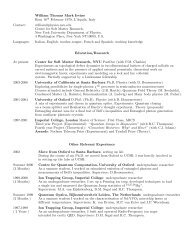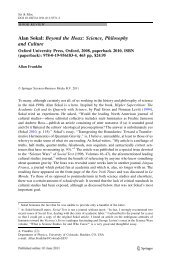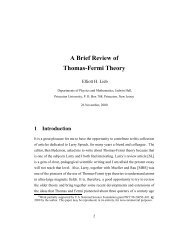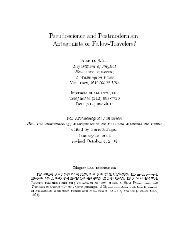Good Confucianism book (pdf) - Department of Physics
Good Confucianism book (pdf) - Department of Physics
Good Confucianism book (pdf) - Department of Physics
You also want an ePaper? Increase the reach of your titles
YUMPU automatically turns print PDFs into web optimized ePapers that Google loves.
220 Notes23 See the Mohist Canons, which have long discussions about the rules <strong>of</strong> logicand how arguments should be structured as well as discussions about similarityand difference and how they are decided. A. C. Graham, Later Mohist Logic,Ethics, and Science (Hong Kong: Chinese University Press, 2003 ).24 Hui Shi, Zhuangzi ’ s friend as portrayed in the Zhuangzi . We have no firmdates for him. It is possible that he lived from about 380 to 305 BCE.25 Zhuangzi ; see Watson, The Complete Works <strong>of</strong> Chuang Tzu [Zhuangzi] , 374 – 5.26 There are no firm dates for Gongsun Long. Some place him from about325 – 250 BCE; others date him about 380 BCE. Most <strong>of</strong> Gongsun Long ’ s writingshave been lost. There are only six essays in a text, Gongsun Long , whichcontains the white horse argument.27 See Wing - tsit Chan, A Source Book in Chinese Philosophy (Princeton: PrincetonUniversity Press, 1963 ), 235f.28 Terms like “ white ” are what Gongsun Long calls zhi , “ to point to ” an idea,an abstract concept.29 Similarly, he argues that a white stone is not hard. This is because when we seethe stone, we can see the “ white, ” but we cannot see “ hard. ” When we feel thestone, we can feel “ hard, ” but we cannot feel “ white. ” So we have epistemologicalpro<strong>of</strong> that “ hard ” and “ white ” are separate universals. We know themin different ways, they cannot be the same, and they do not “ interpenetrate ”each other. This is a position that later Mohists will argue against.30 See J. J. L. Duyvendak, The Book <strong>of</strong> Lord Shang: A Classic <strong>of</strong> the ChineseSchool <strong>of</strong> Law (Chicago: University <strong>of</strong> Chicago Press, 1963 ), and Liu Yongping,The Origins <strong>of</strong> Chinese Law: Penal and Administrative Law in its EarlyDevelopment (Hong Kong: Oxford University Press, 1998 ).31 See H. G. Creel, Shen Pu - hai [Shen Buhai]: A Chinese Political Philosopher <strong>of</strong>the Fourth Century B.C. (Chicago: University <strong>of</strong> Chicago Press, 1974 ).32 See the “ Han Feizi , ch. 50, “ Eminence in Learning. ”33 Han Feizi , “ Wu Du ” ; compare Burton Watson, trans., Han Fei Tzu [HanFeizi]: Basic Writings (New York: Columbia University Press, 1964 ), 111.34 Han Feizi was sent as an envoy from the state <strong>of</strong> Han to the state <strong>of</strong> Qin, wherehe met his fellow student Li Si, by then prime minister <strong>of</strong> the state <strong>of</strong> Qin. LiSi thought in the same way as Han Feizi and so had Han Feizi imprisoned.Fittingly enough, Han Feizi died in prison, likely on the orders <strong>of</strong> Li Si, in 233BCE.35 See the Mencius 7A.26. For Mencius and citations from the Mencius see below.Notes to Chapter 61 The Mencius 6.B.15. My translations follow Lau ’ s numbering system andreaders can consult alternate translations for comparison. An excellent moderntranslation <strong>of</strong> the Mencius with explanatory notes and a discussion <strong>of</strong> how Neo -Confucian readings <strong>of</strong> the text have affected our understanding is Bryan W. VanNorden ’ s Mengzi [Mencius] with Selections from Traditional Commentaries(Indianapolis: Hackett Publishing, 2008 ). An older, though standard, translation<strong>of</strong> the Mencius is by D. C. Lau (New York: Harmondsworth, Penguin,


